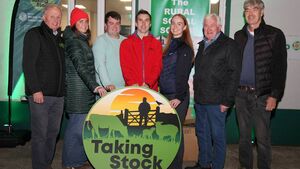'There is a light at the end of that tunnel'

Pictured at the 'Taking Stock' event at Balla Mart were, from left: Laurence Gaughan, HSE Health and Wellbeing Project Manager; Lianne McManamon, Mayo Mental Health Association's Mental Health Promotion Lead; Michael Nolan, Balla Mart Manager; Paul Cunnane, Croí; Anna Cunningham, Mayo Mental Health Association's Student Mental Health Promotion Officer; John Lynskey, Mayo IFA Chairman; John Noonan, Teagasc Westport. Picture: Trish Forde
A clear message of hope and urgency echoed through Balla Mart last Thursday evening when sheep shearer turned mental health advocate, George Graham, called on farmers feeling low to “take that first step”. Mr Graham was speaking at an event called 'Taking Stock, an event organised by Mayo Mental Health Association and the Department of Agriculture.
The Wexford farmer told a deeply personal and unflinching account of his own struggle on an evening devoted to supporting farmers’ health through the long, dark months ahead.
“I’m not afraid or ashamed to say I’ve been to the long, dark tunnel with mental health,” Mr Graham said.
He described suicidal thoughts, planned actions and an internal collapse.
“To be honest, on the law of averages, I shouldn’t be here tonight,” he said.
Mr Graham offered an image of the mind in torment: trapped in a box where every direction is blocked with no exit and no hope visible.
“If you can imagine that,” he said, “that’s where I was.”
He spoke of racing thoughts, insomnia, and failure to eat. He said he tried to outrun the problem, first in Norway, shearing sheep far from home, but he found the darkness followed him.
He described reaching out - hesitantly - to a psychiatric nurse he met in Northern Norway. He asked for translation help, but beneath the surface he wanted to confess his despair. It was a lifeline. He resolved then that if he survived, he would seek help at home. On returning to Ireland, he went to his GP, surrendered his firearm, underwent evaluation, started therapy and medication. Gradually, step by painful step, he found a path forward.
“I was in that situation,” he said. “I couldn’t talk to anybody. If anybody is in a similar situation, they have to take that first step. Go to your GP. Talk to a family member or a friend. No matter how many professionals exist, none can come to you - you must reach out yourself.”
Mr Graham said that mental health problems don’t pause.
“Mental well-being problems don’t stop at halfâthree of a Friday afternoon and recommence at 10.30 on Monday morning.”
He explained how such struggles cut across professions - farmers, vets, doctors, dentists - and across life, and he urged constant vigilance.
Mr Graham emphasised how farming’s isolation intensifies vulnerability. He spoke of how in winter, children return to college, leaving homes quieter, and with shorter, darker days, people can feel lonely. The nature of farming too can present unique problems. He pointed to challenges like disease in stock, market pressures, or TB outbreaks, not just financial, but existential burdens.
“There is a light at the end of that tunnel,” he said, “but you have to make the first move by talking to somebody.”
Mr Graham also spoke on farm safety, delivering blunt warnings drawn from real experience. Many farmers work alone, he said, juggling multiple jobs, and may rush critical tasks.
“Working with machinery, working at height, and working with livestock, these are the areas where serious accidents occur. I have seen a fatality caused by a live power drive. I never want to see one again and I don’t wish anybody else to ever have to see one.
"Some of these things happen just because we don’t spend €100 on a new cover for a PTO shaft. And it can happen in an instant.”
He warned that other dangers come not only from obvious hazards like bulls, but from subtle ones, perhaps the quiet cow at calving time. Farmers often feel compelled to intervene, no matter how dangerous, placing themselves between a cow’s head and a wall.
He also sounded a warning about hidden hazards, especially agitating slurry.
“We won’t see it, we won’t feel it, until you inhale the fumes, and the next thing you fall down, and that’s usually the end. You’re very lucky if you survive that one,” Mr Graham said.
He urged vigilance, proper ventilation, and time for caution, adding: “We’re in a hurry, until the accident happens.”
Mr Graham urged farmers to visit their GP for regular check-ups.
“People will get their car tested and taxed annually, but they won’t take half an hour to visit a GP,” he said. “There’s no point in having more sheep, more stock, a bigger house, if you haven’t got your health. You’re not just doing it for yourself, you’re doing it for your family as well.”
The event offered featured free health checks from the Croí Mobile Unit, information stands, and refreshments. Expert speakers, including Teagasc Drystock Advisors Alan Nolan and Shane O’Haire, and local vet Shane McCarvill, addressed scheme updates, farm management, and livestock health (see opposite page).
The event concluded with a panel discussion involving Mr Graham, Siobhan McBrearty of the HSE and Leanne McManamon of Mayo Mental Health. The speakers urged farmers to take action over their mental and physical health.




